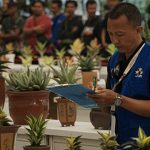Jakarta (Greeners) – Indonesian green watchdog, WALHI, slammed both presidential candidates for their lack of comprehension and dodged substantial discussion on environment issues at the latest leg of presidential debate on Sunday night.
Nur Hidayati, one of the panels for the second debate that discussed the themes of Agriculture, Energy, Infrastructure, Natural Resources and Environment, said both candidates provided poor answers.
“WALHI thinks that both candidates are lacking in visions. The candidate number one claimed overly by promoting on what the government has been doing for four years. Though it is natural for incumbent to want to boast his achievements, however it should not neglect the negative impacts of current development,” said Nurhayati, who is also Executive Director of WALHI, in Jakarta, on Monday (18/02/2019). “Meanwhile, the candidate number two looked like he did not know the issue and just generally speaking, only jargons.”
READ ALSO: Environmental Organizations Dropped Questions for Upcoming 2019 Presidential Debate
Furthermore, she underlined that both candidates have failed to discuss negative impacts of infrastructure for the environment.
She cited Prabowo only touched the issue of land compensation and swapping excluding land conflicts mechanism.
Meanwhile, for Jokowi, she added he denied conflicts caused by infrastructure development to ever happen under his 4.5 years of administration.
Based on Presidential Staff Office report, at least 555 conflicts have been reported to the office, with 631 families impacted in 19 cases alone which covers a total of 2,288,536 hectares.
On palm oil, she said both candidates supported the development and promoted biodiesel, but neglected to mention its significant environmental impacts.
“How the improvement of the system (of oil palm industry) in the future and efforts to tackle the social and environmental impacts were not apparent in their answers. They only stated supporting biodiesel, B20-B100. Even the second candidate wanted to go back to the past by implementing people plantation (PIR) which NGOs argued as one of company’s tactics for land grabbing people’s plantation (area),” Fathilda Hasibuan, Campaign Manager for Forest and Plantation of WALHI.
READ ALSO: Indonesia Faces Challenges for Its Organic Fuel Implementation
Meanwhile, on energy, Anggalia Putri, Manager of Knowledge Management of Madani Berkelanjutan Foundation, cited Jokowi’s statement to reduce fossil fuel through B20 and B100 programs was contradictory with his own wish to explore offshore oil drilling.
Indonesia has targeted renewable energy mix for 23 percent by 2025, despite coal fueled power plants still dominating, for 31 percent.
“At the debate, though both candidates have included vision and mission of renewable energy development, the mechanism to accelerate renewable energy remains unclear, including the strategy to improve energy and electricity management. They’re focusing on biodiesel/bioethanol development, meanwhile there are others renewable resources can be developed, such as energy efficiency, solar roof, battery, electric cars, and cheaper smart home system,” said Putri adding fossil fuel dependence will burden economy, either fiscal or environment.
Furthermore, she said that renewable energy should be able to be presented as strategic solution when the video of coal mining pits was shown in the debate.
However, both candidates did not touch at all the plan to rehabilitate mining activities as the beginning of recovery efforts.
Reports by Dewi Purningsih



















































